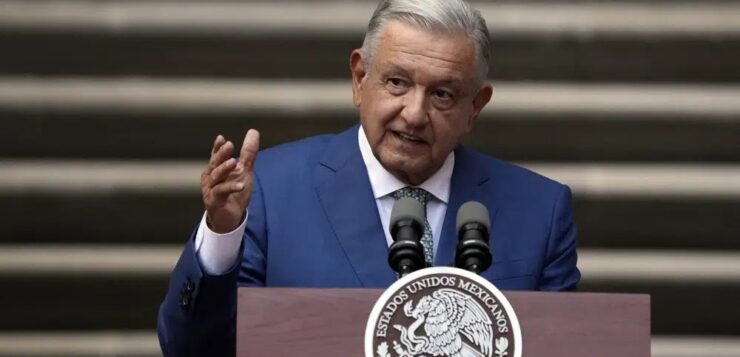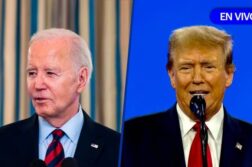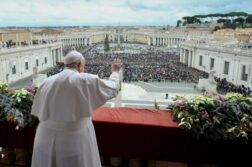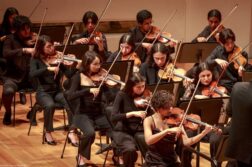By FABIOLA SÁNCHEZ
MEXICO CITY (AP) — Mexico’s elections chief slammed President Andrés Manuel López Obrador’s move to cut elections spending as an assault on democracy Thursday — criticism the leftist president dismisses as elitist.
López Obrador said Thursday he he’ll sign the changes into law, even though he expects court challenges. The new law passed late Wednesday would cut funding for the country’s electoral agency and weaken oversight of campaign spending. The president has long said the agency is too expensive and that the money would be better spent on the poor.
The reforms have prompted fierce debate, and opponents already have announced lawsuits and protest marches in several cities. López Obrador already has taken to branding them as classist, racist defenders of corruption.
“They are protesting because don’t want to help the poor,” López Obrador said earlier this week, accusing his opponents of being “racist” and “classist.”
Lorenzo Cordova, the head of the elections agency, the National Electoral Institute, has said the reforms “seek to cut thousands of people who work every day to guarantee trustworthy elections, something that will of course pose a risk for future elections.”
The new law would cut salaries, funding for local election offices and training for citizens who operate and oversee polling stations. It would also reduce sanctions for candidates who fail to report campaign spending.
Cordova warned in a newspaper column published Thursday that the insults being hurled around the issue “aid and assist the authoritarian impulses that are floating around.”
“The virulent discourse being used by some could wind up poisoning democracy itself,” Cordova wrote.
Jaime Rivera, one of council members at the electoral institute, warned that as many as 4,000 employees could get the axe under the new funding cuts, something he said could cause “the collapse of the electoral organization.”
López Obrador was nonchalant about court challenges to the election reforms saying Thursday that he believed they would be upheld because none of it was “outside the law.”
However, in the past he has frequently attacked Mexico’s judiciary and claimed judges are part of a conservative conspiracy against his administration.
The president’s strident pushback against the judiciary, as well as regulatory and oversight agencies, has raised fears among some that he is seeking to reinstitute the practices of the old Institutional Revolutionary Party, which bent the rules to retain Mexico’s presidency for 70 years until its defeat in the 2000 elections.
Elections in Mexico are expensive by international standards, in part because almost all legal campaign financing is, by law, supplied by the government. The electoral institute also issues the secure voter ID cards that are the most commonly accepted form of identification in Mexico, and oversees balloting in the remote and often dangerous corners of the country.
Federico Estevez, a retired political science professor at the Autonomous Technological Institute of Mexico, said the opposition claims that López Obrador is “dismantling democracy” are exaggerated.
“It’s not about undoing democracy, it’s a different conception of democracy,” Estevez said. “It’s more majoritarian, and less dependent on inadequate, unproductive and mistaken elites.”
Patricio Morelos, a political scientist at the Monterrey Technological university, said the reforms could undermine confidence in elections.
“Reducing costs could mean some savings in monetary terms, but that does not mean it would increase confidence in electoral processes or their legitimacy,” Morelos said. “That should be the main goal, that people have confidence that their vote will count.”
López Obrador remains highly popular in Mexico, with approval ratings of around 60%, but cannot run for re-election. Part of his popular appeal comes from railing against high-paid government bureaucrats, and he has been angered by the fact that some top electoral officials are paid more than the president.
His legislative initiative, known as “Plan B”, was proposed by the president in December after he did not obtain enough votes in Congress for even deeper electoral changes that would have changed the size and makeup of Congress.
The president has repeatedly denied that the reform package could put the elections in Mexico at risk.
López Obrador and his supporters have been critical of the electoral institute since 2006 when he came within 0.56% of the vote of winning the presidency and denounced his loss as fraudulent. He and his supporters launched a mass protest movement.
“This is still driven by his grievances from from those years,” Estevez noted.
López Obrador later won the presidency by a wide margin in 2018.
Many in Mexico see the electoral institute as a key pillar of the country’s modern democracy since 2000.
López Obrador’s ruling Morena party is favored in next year’s national elections and the opposition is in disarray, which would seem to give the president little incentive to attack the electoral institute.





